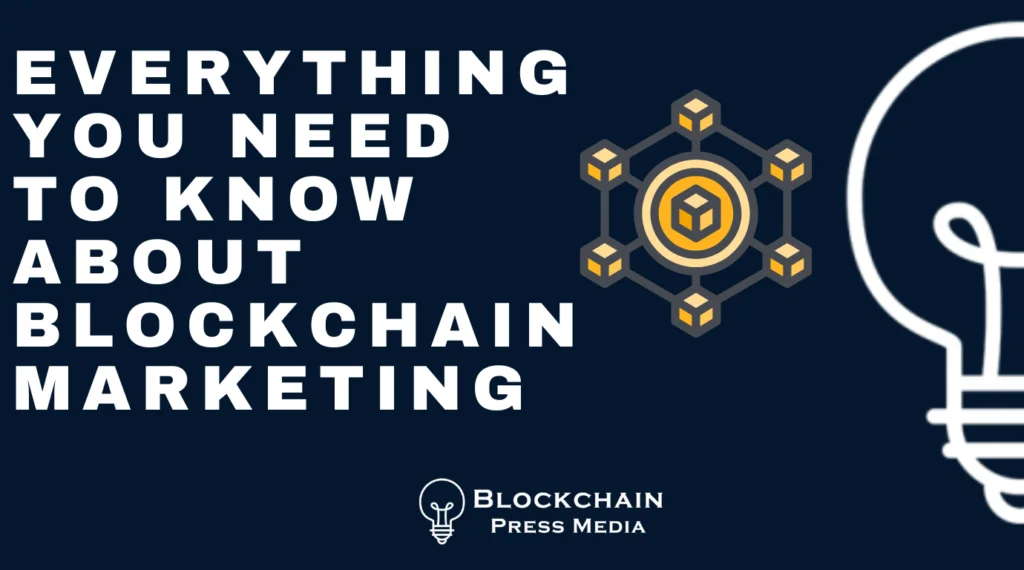As the digital world continues to evolve, one technology stands as a trailblazer, revolutionizing numerous industries with its transformative potential: blockchain. It is no longer just the backbone of cryptocurrencies; it’s a driving force that’s redefining sectors, including marketing.
In this detailed exploration, we’ll unpack the concept of blockchain marketing, providing a comprehensive understanding of its potential, implications, and the seismic shift it’s creating in the marketing landscape.
What is the Blockchain?

Blockchain is essentially a decentralized digital ledger designed to record transactions across multiple computers simultaneously. This innovative technology ensures data immutability, transparency, and enhanced security, making it near-impossible for information to be altered or falsified once recorded. Initially known as the driving force behind cryptocurrencies like Bitcoin, blockchain has now proven its merit in various fields, including the marketing industry.
What is Blockchain Marketing?
Blockchain marketing is the strategic application of blockchain technology to enhance and revolutionize marketing efforts. By leveraging blockchain’s core principles—decentralization, transparency, and security—it addresses long-standing challenges in traditional marketing. Blockchain marketing paves the way for a more transparent, secure, and fair marketing ecosystem, shifting the paradigm from a centralized model controlled by intermediaries to a more equitable and decentralized one.
5 Ways Blockchain Will Revolutionize the Digital Marketing Landscape
Blockchain’s transformative potential promises a sea change in the digital marketing landscape. Here’s a deep dive into how it could revolutionize the industry:
1. Improve Security
Blockchain’s unique structure fortifies security, significantly reducing the risk of data breaches—a persistent concern in the digital marketing industry. By securely encrypting data and dispersing it across numerous nodes in the network, blockchain technology makes unauthorized access incredibly difficult. In addition, this robust security framework assures customers of their data’s safety—which is vital in building and maintaining consumer trust.
2. Buy Ads Cheaper Without a Middleman
Traditionally, digital marketing involves numerous intermediaries, such as ad agencies and digital platforms, each taking a cut of the ad spend. Blockchain technology can eliminate these middlemen by facilitating direct transactions between advertisers and publishers. This reduces costs and enhances transparency in the ad-buying process.
3. Access to Consumer Information
With blockchain technology, companies can create a more accurate and comprehensive consumer profile. When customers voluntarily share their data in a blockchain-enabled system, their information is verified, securely stored, and easily accessible. This allows marketers to understand their customers better and deliver more personalized and effective marketing campaigns.
4. Alternate Payment Systems
Blockchain is the technology that powers cryptocurrencies, which are becoming an increasingly popular payment method. By accepting cryptocurrencies as a payment option, businesses can appeal to a broader audience, especially tech-savvy, privacy-conscious customers. Moreover, blockchain’s global accessibility can help businesses expand their reach beyond geographical boundaries.
5. Showcase Social and Environmental Responsibility
Blockchain’s transparency and traceability features can be leveraged by companies to showcase their social and environmental responsibility. For instance, a company can use blockchain to verify and share its supply chain information, proving to customers that its products are ethically sourced and environmentally friendly.
Pros and Cons of Blockchain Marketing

Like any technology, blockchain marketing has its own set of advantages and challenges. Here are a few to consider:
Pros
- Transparency: Blockchain’s inherent transparency can significantly enhance trust between businesses and consumers. Each transaction is recorded and visible, making the system open and verifiable.
- Security: The decentralized and immutable nature of blockchain makes it highly secure. Data, once stored on a blockchain, is near-impossible to tamper with, significantly reducing the risk of fraud.
- Efficiency: Blockchain can automate various processes in marketing, such as transactions via smart contracts, leading to increased efficiency.
- Improved Customer Insights: Blockchain can generate more accurate consumer profiles by verifying each user’s authenticity, leading to improved targeting and personalization.
Cons
- Complexity: The technical complexity of blockchain marketing can pose a challenge for those unfamiliar with the technology.
- Scalability: As of now, certain blockchain networks face scalability issues, which may limit their application in large-scale marketing operations.
- Regulation: The regulatory landscape for blockchain marketing is still evolving, which can cause uncertainty.
- Adoption: Despite its benefits, blockchain adoption in marketing is still in its early stages. Businesses and consumers may take time to adapt to this new approach.
How Blockchain Technology Can Impact Digital Marketing?
Blockchain’s impact on digital marketing is far-reaching, offering solutions to longstanding issues and introducing fresh avenues for customer engagement. Here’s how:
Keyword Tracking
In SEO and PPC campaigns, keyword tracking is crucial. Blockchain technology offers an improved method for advertisers to track their keywords’ performance, providing a clear, unalterable record of each click’s origin. This leads to more accurate campaign data and can help optimize marketing efforts.
Improved Lead Quality
Blockchain can help enhance lead quality by verifying the authenticity of every user action. This prevents fraudulent activities and ensures that marketers focus on genuine leads, thereby improving conversion rates and ROI.
Tools for Tackling Ad Fraud
Ad fraud has been a perennial issue in digital marketing. Blockchain’s transparency and security features can provide a robust solution, ensuring that every ad click is genuine and every user is authentic. This can significantly reduce ad spend wastage and improve campaign performance.
Better Transparency for Consumers
By leveraging blockchain’s transparency, companies can offer customers a clear view of their data usage, supply chain practices, and more. In addition, this transparency can boost customer trust and loyalty, essential factors in today’s conscientious consumer market.
Why Blockchain in Marketing?

The integration of blockchain in marketing offers several compelling benefits:
Decentralization
Unlike traditional marketing models, blockchain operates on a decentralized network, eliminating intermediaries and allowing for direct interaction between businesses and consumers.
Immutability
Once data is added to a blockchain, it becomes nearly impossible to alter or delete. This immutability enhances data security and trust, critical elements in the data-driven world of digital marketing.
Transparency
Every transaction on a blockchain is visible to all network participants, ensuring complete transparency. This feature can be harnessed in marketing to build customer trust and drive engagement.
8 Blockchain Strategies and Best Practices for Marketing
Implementing blockchain in marketing requires careful planning and strategic thinking. Here are some strategies and best practices to consider:
- Understand the Technology: Before diving into blockchain marketing, ensure you understand the technology, its capabilities, and its limitations.
- Start Small: Consider starting with a small, manageable blockchain project before scaling up.
- Prioritize Transparency: Use blockchain’s transparency to your advantage. Share relevant information with customers to build trust and loyalty.
- Leverage Smart Contracts: Use blockchain’s smart contracts to automate transactions and improve efficiency.
- Focus on Security: Highlight the security benefits of blockchain to your customers, particularly when handling sensitive data.
- Embrace Cryptocurrencies: Consider accepting cryptocurrencies as payment to tap into a new customer base.
- Partner with Experts: Collaborate with blockchain experts or agencies to effectively implement and manage your blockchain marketing initiatives.
- Stay Updated: Blockchain is a rapidly evolving technology. Stay updated with the latest developments to harness its full potential.
4 Benefits of Blockchain in Marketing

In the evolving landscape of digital marketing, the integration of blockchain technology offers numerous benefits. Let’s take a deep dive into four key advantages that blockchain brings to the marketing table:
1. Audience Targeting
In traditional marketing, understanding your audience is often based on collected data that may or may not be entirely accurate. With blockchain, audience targeting can reach a new level of precision. Blockchain technology allows for the creation of verified user profiles based on data that users themselves have agreed to share.
This data is transparent and immutable, leading to more accurate insights about customer behavior, preferences, and needs. As a result, marketers can tailor their strategies with exceptional precision, delivering personalized content that resonates with the audience’s expectations and demands.
2. Reduced Costs
Blockchain’s decentralized nature eliminates the need for intermediaries or middlemen in transactions. In digital advertising, for example, marketers often have to go through multiple intermediaries, including ad exchanges and data management platforms, all of which require a fee.
By enabling peer-to-peer transactions, blockchain cuts out these middlemen, thereby reducing overall costs. Furthermore, blockchain’s inherent transparency ensures that marketers pay only for genuine clicks and impressions, eliminating the wastage of resources on fraudulent activities.
3. Decentralized Applications (DApps)
Decentralized applications, or DApps, are applications that run on a blockchain network. These applications are not controlled by a single entity and offer a new avenue for marketers to reach and engage with their audience.
DApps can be used to create decentralized social media platforms, loyalty programs, and even digital marketplaces. The transparency and security of these applications can foster trust and engagement among users, enhancing brand loyalty and customer retention.
4. Increased Efficiency
Blockchain can automate various processes in the marketing domain, leading to increased efficiency. For instance, smart contracts—self-executing contracts with the terms of the agreement directly written into code—can automate the ad-buying process, ensuring that payment is released only when the agreed-upon conditions (like a certain number of clicks or impressions) are met.
This saves time and eliminates the possibility of disputes or fraud. Similarly, blockchain can streamline other marketing processes, such as supply chain tracking, customer data management, and more.
Embracing the Future
The intersection of blockchain and marketing is a dynamic space filled with tremendous potential. This revolutionary technology presents an arsenal of tools capable of addressing longstanding challenges in the marketing realm and unlocking fresh avenues for customer engagement.
From fostering a new era of transparency and trust to driving efficiency and reducing costs, blockchain is steadily rewriting the rules of the game. As marketers, the opportunity lies in understanding this innovative technology and harnessing its power to redefine how we engage with our audience.
As we step into a future where blockchain becomes an integral part of marketing strategies, we are not just witnessing a transformation. Instead, we are participating in a revolution that is set to make marketing more secure, efficient, and personal than ever before.
FAQs For Blockchain Marketing
Blockchain introduces a new level of transparency and security in marketing, addressing issues like ad fraud, data privacy, and inefficient middlemen, leading to more trust and efficiency in marketing operations.
Blockchain can enhance marketing strategies by providing accurate consumer data, improving ad targeting, reducing costs by eliminating intermediaries, and fostering customer trust through transparency and data security.
Blockchain is used in marketing for audience targeting, ad verification, supply chain transparency, and eliminating intermediaries in transactions. It also supports the creation of decentralized applications (DApps) for enhanced customer engagement.
Blockchain and marketing intersect in areas like data security, transparency, and efficiency. Blockchain’s capabilities can solve some of the most persistent issues in marketing, making the relationship symbiotic and transformative.
Blockchain in SEO could mean enhanced transparency in keyword tracking and performance, ensuring that marketers pay only for genuine clicks and impressions. It could also help verify the authenticity of backlinks, enhancing SEO integrity.
Web3 marketing refers to marketing strategies that leverage the decentralized, user-centric nature of Web3 technologies, like blockchain. It includes practices like decentralized social media marketing, crypto-based loyalty programs, and more.
For consumers, blockchain offers data security, transparency in transactions, and control over personal data. It also enables verified reviews and ratings, leading to more informed decision-making.
The relationship between blockchain and marketing is transformative. Blockchain’s features like transparency, immutability, and decentralization offer solutions to longstanding marketing issues, creating a more efficient, secure, and customer-centric marketing ecosystem.
Blockchain can enhance CRM by creating a single, verifiable view of each customer, improving data security, and automating various processes through smart contracts, leading to enhanced efficiency and customer satisfaction.
Blockchain solves business problems by offering transparency, security, and efficiency. It can address issues like fraud, inefficiencies in supply chains, data breaches, and more.
For startups, blockchain can provide a secure, efficient, and cost-effective framework for operations. It can help in areas like fundraising through ICOs, improving customer trust through transparency, and optimizing processes through smart contracts.

